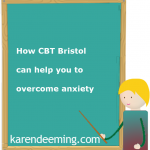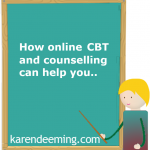In response to Coronavirus (Covid-19), I am offering telephone, online counselling and CBT sessions via Zoom and WhatsApp.
Today it’s Halloween so I thought it rather fitting to briefly talk about human beings and their shadows.
I also wanted an excuse to show you a photo of the amazing pumpkin face that my partner Liam made earlier today!!!
“ Everyone carries a shadow, and the less it is embodied in the individual’s conscious life, the blacker and denser it is. At all counts, it forms an unconscious snag, thwarting our most well-meant intentions.” Carl G Jung
According to Carl Jung, the shadow alias “the other side” is an archetype, meaning that it exists in all of us. The shadow contains everything denied and despised, everything considered sinful and everything we find awkward or unnerving. Furthermore, it accounts for the cruelties which people have inflicted on each other since the beginning of time. In religious terms, the shadow is symbolised by Satan and in fiction, fairytales and mythology the shadow is seen in many guises such as Faust who made a pact with the devil Orpheus seeking Eurydice in the underworld and Dr Jeckyll who transformed into the evil Mr Hyde. Essentially, the shadow is perceived as the dark side of the individual but one should not disregard the undeveloped positive parts it contains. Jung believed the shadow to be inferior and primitive in nature. Therefore since it is instinctive, it is likely to have a disturbing influence on our personalities unless it is confronted.
Key negative emotions often pushed into the shadow include rage, jealousy, shame, lying, resentment, lust, greed, suicidal/murderous tendencies and so forth. Positive shadow traits encompass infantile parts, emotional attachments, neurotic symptoms, underdeveloped talents and gifts. Jungian Analyst, Liliane Frey-Rohn, says of the shadow “retains contact with the lost depths of soul, with life and vitality – the superior, the universally human, yes, even the creative can be sensed there.”
The shadow may manifest itself in a wealth of images including temptation. Shakespeare eloquently presents in the play Macbeth a story about a character brought down by temptation and his own ambition.
Enigmatic Netherlands painter, Hieronymous Bosch’s triptych, Garden of earthly delights offers for some a symbolic vision of man’s sinfulness and for others an earthly paradise. In the centre appears man’s folly after a fall.
In a therapeutic context, a Jungian therapist explores the shadow side of the client’s personality through listening to messages of their dreams paying attention to projections and encouraging the client to participate in active imagination in order to reintegrate the client’s different parts.
I suspect my first conscious acquaintance with the shadow, as it were, was when I attended a Halloween party in 2003. As soon as I arrived at the house, I experienced overwhelming feelings of unease and in terms of coping mechanisms; so to speak, I drank a significant amount of alcohol. On reflection, I believe this occurred because my introvert archetype “small voice” repressed in the unconscious shadow was trying to move into the conscious. Encouragingly, following therapy sessions during my MA psychotherapy training, I have since welcomed this beneficial character. Infact, I have grown rather fond of her because she possesses many positive qualities such as the ability to rationalise and confront my predominately negative aggressive destructive archetype “the wild thing.” I excluded the small voice because: she did not meet with approval from my peers at school and; I often heard my parents expressing their concerns about my inhibiting shyness with family and friends.
Shadow Friend or Foe ?
Exposing parts of your shadow can feel risky. To effectively work with your shadow, you need a place where you feel safe and where you can trust others because the core of every shadow contains a nugget of strength and power. Exploring the shadow can have useful benefits because it is like a gold mine of creative, useful energy. Fortunately, thus far, tackling my shadow has been hugely beneficial and I have frequently experienced a great sense of well-being and am now much more comfortable given that many of my unwelcome characters have been integrated and have been allowed space in my psyche. Nonetheless, I should emphasize that the therapist I saw during my training as a Psychotherapist, worked at a slow pace with me to keep the shadow safe and has helped me break down the task of confronting the shadow into manageable parts, to ensure that I did not lose my perspective. On a more negative note, working with shadows can mess up your life after all that’s why you put parts of yourself in this cauldron in the first place !! Furthermore, shadow work is by no means foolproof and may be detrimental to the heath of some individuals particularly those out of touch with reality.
Over to you
If after reading this blog you realise that you need support to help you overcome feelings that can emerge via your shadow such as low moods, anxiety, stress and feeling overwhelmed with distractions and negative thoughts you are not alone in this very common dilemma. So don’t panic or give up just yet.
Counselling or psychotherapy can help you.
You can book your appointment here or you can contact me on (044) +7950 751352 for outside the UK or 07950 751352 inside the UK. Alternatively by email: karen@karendeeming.com.


![Karen_Deeminga[1]](http://www.karendeeming.com/wp-content/uploads/2015/09/being-practice-self-portrait-e1541437891746.jpg) Welcome to my site. if you have any queries then please
Welcome to my site. if you have any queries then please

